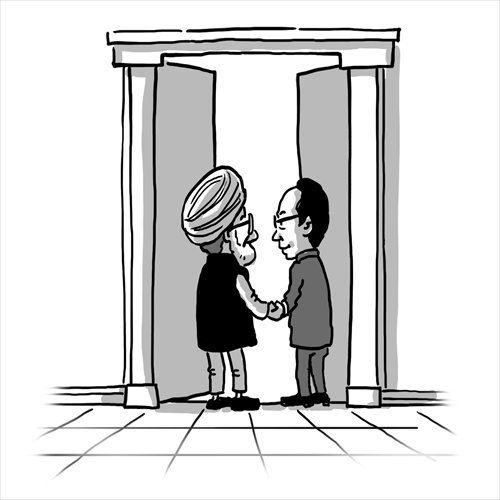Beijing and New Delhi can open an Indo-Asia-Pacific era

Illustration: Liu Rui/GT
Chinese President Xi Jinping kicked off his week-long regional tour to Tajikistan, Maldives, Sri Lanka and India on Friday. A visit to Pakistan was originally included in the tour, but was put off due to political turmoil in Islamabad.
Amid the week-long trip to peripheral countries, Xi's visit to New Delhi has drawn particular attention worldwide.
China and India are rising almost simultaneously. Their bilateral relationship is of critical significance to the regional and world pattern. As two members of the BRICS group and the G20, China and India share extensive common interests in issues such as the reform of international financial system, climate change, and international trade negotiation. The founding of the BRICS development bank struck a heavy blow to the Western-dominated international order.
China and India have also cooperated on myriad of regional issues like regional economic integration, the Afghanistan issue and crackdown on terrorism. China is India's largest trading partner, and their economic collaboration will inject vigorous impetus to the Indian economy.
Admittedly, there are many unsolved questions left over by history between China and India, among which the border dispute is the biggest obstacle to the bilateral relationship.
Besides, with the intensifying of China's economic activity in South Asia and the Indian Ocean, India's strategic suspicions of China have accumulated.
Some Western countries have taken advantage of this to fan the flames of the strategic competition or even confrontation between China and India.
Nonetheless, as Xi said, "If the two countries speak in one voice, the whole world will attentively listen; if the two countries join hand in hand, the whole world will closely watch," when meeting with Indian Prime Minister Narendra Modi at the sixth BRICS summit in Brazil.
"Indo-Asia-Pacific" has emerged as a new geopolitical term in recent years. There are two different propositions. One underlines its geopolitical and geostrategic significance, advocating the establishment of a political, military and value alliance from the Pacific Ocean to the Indian Ocean.
The other demands countries within the region conduct economic cooperation, expanding the industry chains and financial networks of the Northeast Asia to the Indian Ocean region so as to prosper economy. The latter is embodied in the "One Belt and One Road" strategy of China.
India holds a critical position in both propositions. In the first proposition, to construct an "Indo-Asia-Pacific" from the geopolitical perspective may lead to military and strategic competition or conflicts, while in the second, which emphasizes geoeconomic significance, there will be more cooperation.
Economic cooperation will undoubtedly top the agenda during Xi's visit. Since Modi took office, he has prioritized economic reform, infrastructure construction and the development of the manufacturing industry. In these aspects, China has not only abundant capital but also mature technologies.
The construction of the Bangladesh-China-India-Myanmar (BCIM) Economic Corridor and the Maritime Silk Road is another important field of China-India cooperation.
India plans to introduce Japanese investment to develop its northeastern part. Such a plan is not contradictory to, but complementary to, the building of the BCIM Economic Corridor.
Besides economic cooperation, Xi and Modi will talk frankly about a wide range of issues such as the border dispute, the Dalai Lama issue and the trade imbalance.
Some Indian scholars hold that political divergences could be separated from economic cooperation when it comes to India-China relationship. This is infeasible. Sound political relations are the guarantee of economic cooperation. Border disputes are the root cause of mutual distrust between China and India. But both are doing their best to find a solution.
Whether China and India can realize sound cooperation is the key to the establishment of the "Indo-Asia-Pacific" community. Both countries should create favorable conditions to maintain the positive momentum of top-level communication. At the same time, they should strengthen media and grass-roots interaction to increase mutual understanding.
The author is a research fellow of Shanghai Institutes for International Studies. opinion@globaltimes.com.cn